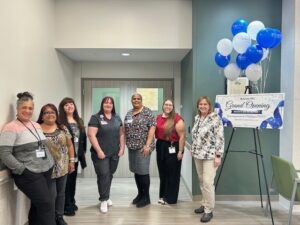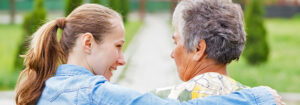Dehydration and the Elderly
For seniors, dehydration is the most common fluid and electrolyte problem that can lead to hospitalization. As people age, they become more susceptible to dehydration as a result of medications, a decreased thirst perception, decreased kidney function, or illnesses.
One of the most important things to know when it comes to dehydration is that early detection is key. By monitoring one’s overall body weight, it’s easier to notice weight loss due to dehydration. If there is a discrepancy on the scale, note any other symptoms and increase the intake of fluids immediately.
Dehydration Symptoms
The most common symptoms associated with senior dehydration include:
- Weakness, dizziness, or headaches
- Dry lips and mouth
- Irritability, muscle twitching, or restlessness
- Dark, strong-smelling urine
- Poor skin turgor (elasticity)
- A decrease in blood pressure with an increase in pulse and respirations
- Weak pulse
- Confusion
If any of these symptoms start to develop, it’s important to talk to a primary care doctor to see if further treatment is needed. As mentioned above, by catching the signs and symptoms of dehydration early, it is much easier to prevent major issues and get back on track.
Dehydration Treatment
The way dehydration is treated in seniors depends on whether it is mild, moderate, or severe.
- Mild dehydration – This simple form of dehydration is typically treated by increasing fluid intake. Typically, a doctor would recommend fluids with electrolytes to help with rehydration. Trying to drink on a schedule might help serve as a reminder to stay hydrated throughout the day.
- Moderate dehydration – This type of dehydration is slightly more serious, especially for the elderly. Intravenous fluids might be necessary and can be found in the ER, a hospital, or outpatient urgent care.
- Severe dehydration – This is especially dangerous for the elderly. Severe forms of dehydration can lead to a drop in blood pressure, kidney failure, or even death. Hospitalization, surveillance, and treatment from a doctor are all necessary.
Preventing dehydration is simple enough. Simply consuming enough fluids and electrolytes throughout the day, as well as eating foods high in water-content, can help. Try to keep a bottle of water within reach at all times to encourage constant hydration.
Finding Help at McGregor PACE
McGregor PACE is a Program of All-Inclusive Care for the Elderly. Under the PACE program, we provide services that address the medical, rehabilitative, social, and personal care needs of older adults.
If you or a loved one needs help preventing or treating symptoms of dehydration, contact us today or call 216.791.3580 to learn more about our offerings for seniors, 55 years of age and older.


